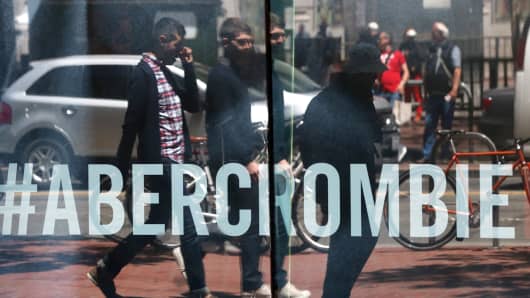May a clothing retailer deny someone a sales job if attire the person wears to her interview clashes with the retailer's brand style and the applicant fails to inform the retailer that the offending attire is required by her religious beliefs?
That is the question the United States Supreme Court has agreed to answer. The case is against clothing retailer Abercrombie & Fitch, brought by the federal Equal Employment Opportunity Commission on behalf of Samantha Elauf, a then-17 year-old Muslim woman. Elauf wore a black headscarf to her interview as a sales associate, or "model" in A & F parlance, at an Abercrombie Kids store in Tulsa, Okla.
Read MoreBusted! Why 'Real Housewives' star got prison time
Ms. Elauf ultimately was rejected when she was given a disqualifying score of 1 out of 3 in the category of "appearance and sense of style." The headscarf violated A & F's "look policy," which barred models from wearing black and which required models to dress in the "classic East Coast collegiate style of clothing" associated with the brand.
It came out that the assistant store manager who conducted the interview assumed that Ms. Elauf wore the scarf because she was a Muslim. Ms. Elauf, however, never said anything about the scarf being religiously required and the assistant manager didn't raise the issue either. Did the applicant's silence get A & F off the hook for religious discrimination under the federal employment discrimination law when it indisputably rejected Ms. Elauf's application because the head scarf was inconsistent with the image A & F wanted to project to its customers?
The law generally gives employers in any industry broad discretion to set dress and grooming standards. That, in turn, gives employers the right to fire or decline to hire people who do not meet those standards.
Read MoreThese jobs are drying up in 2014
Some employers avoid detailed dress codes, opting instead for a simpler approach. When General Motors CEO Mary Barra was head of the company's human resources department in 2009, she replaced GM's 10-page dress code with a two-word code – "dress appropriately," according to a recent report in Fortune. Some employers, however, opt for detailed dress and appearance guides, especially, one would assume, companies whose brands are associated with a distinct style. Both approaches are legally acceptable.
But the employer's power is not unlimited. An employer cannot, for example, set strict dress requirements for women and set no dress requirements for men. An employer also must reasonably accommodate the dictates of an employee's religious beliefs, including beliefs associated with dress and appearance.
Is an employee or applicant denied legal protection under the employment discrimination law if she does not disclose to an employer that something she is wearing is an article of faith not fashion? Complicating the analysis is that it is illegal for an employer to ask an applicant questions about their religion. Can that conundrum be avoided, as the EEOC asserts, by obligating employers to explain their appearance policies to would-be employees and ask if there is any reason the employee could not meet those policies? Do certain obvious signifiers of certain religions trigger this facially neutral inquiry while more obscure religious signifiers do not?
Read More1 in 4 millennials trust no one about money: Study
And what about corporate policies that go beyond dress? Is an employer obligated to advise all applicants of all employer policies that could conflict with any conceivable practice of any religion? On the other hand, to obtain the full measure of protection of the employment-discrimination law, is an applicant required to share all religiously mandated practices to which she adheres that could conceivably conflict with any conceivable employer policy? The employer knows everything about its policies and yet is not allowed to ask about its prospective employee's religion; the applicant knows everything about her own religion, none of which she is required to share, and yet limited information about her prospective employer's policies. How, at the outset, does either side know there's even a potential clash?
The challenge for the high court will be to resolve these riddles without, on the one hand, imposing a duty on employers to make inquiries triggered by assumptions rooted in stereotypes and without, on the other hand, imposing a duty on the employee to share information about her religion that may not be the legitimate basis for any employment decision.
The clear and noble mandate of the law is a workplace that accommodates bona fide religious requirements. But how does one reach that goal in a legal framework that promotes bilateral silence?
Commentary by Dan Eaton, a partner with the San Diego law firm of Seltzer Caplan McMahon Vitek where his practice focuses on defending and advising employers. He also is a professor at the San Diego State University College of Business Administration where he teaches classes in business ethics and employment law. Follow him on Twitter @DanEatonlaw.


